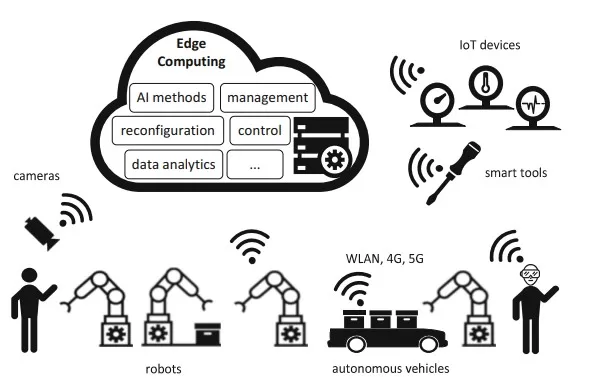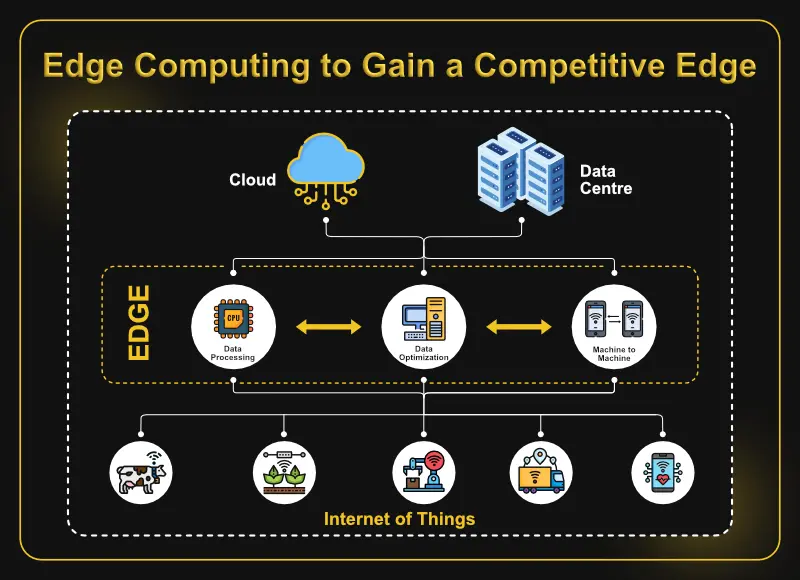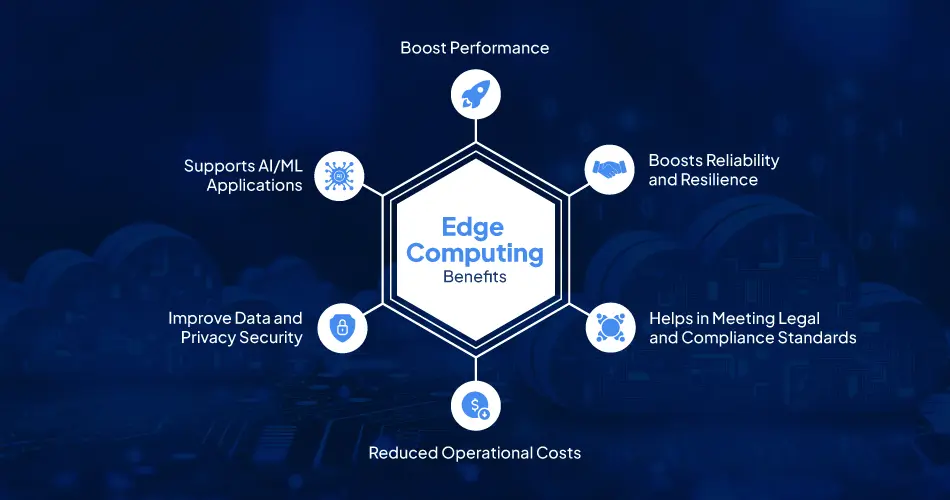Kuwait is embracing a new era of digital transformation, one where edge computing is enabling real time data processing like never before. In this article, we will explore how this innovative approach is reshaping industries, powering smarter decisions, and improving everyday life for businesses and individuals across the country.
Understanding Edge Computing
Edge computing moves data processing closer to where it is generated at the “edge” of the network. Instead of sending every piece of data to centralised cloud servers, edge devices process and analyse information locally. This reduces latency significantly, enabling instant feedback, faster decision making, and more reliable services.
Why Real Time Data Matters in Kuwait
In Kuwait’s fast paced environment be it smart city infrastructure, oil and gas operations, healthcare, or retail seconds can make a difference. Real time data ensures that alarms trigger immediately, machines self correct instantly, and services respond to users without delay. Whether it is adjusting traffic lights, monitoring pipelines, or enhancing patient care, real time responsiveness is critical.
Accelerating Smart Cities
Kuwait’s smart city initiatives benefit hugely from edge computing. Traffic sensors, surveillance systems, and environmental monitors all generate massive amounts of data. Processing that data near its source enables immediate insights: traffic congestion can be diverted, air pollution spikes can be addressed swiftly, and energy usage can be optimised. Edge supported networks make these systems more resilient and responsive.
Transforming Oil and Gas Operations
Kuwait’s backbone industry oil and gas is highly data intensive. Millions of data points stream from sensors embedded in drilling equipment, pipelines, and refineries. Edge computing processes this data onsite, identifying anomalies instantly and predicting maintenance needs before breakdowns occur. This not only saves time, but also prevents costly downtime and environmental risks.

Enhancing Healthcare with Instant Insights
Kuwait’s healthcare providers are beginning to deploy edge enabled devices in hospitals and clinics. Patient monitoring devices can analyse vital signs in real time, alerting medical staff to critical changes immediately. This rapid detection can be lifesaving, especially in emergency rooms or critical care units. Edge solutions also protect sensitive data by processing it locally, reducing exposure.
Enabling Retail and Consumer Experiences
Retailers in Kuwait are leveraging edge computing to deliver seamless shopping experiences. Smart stores analyse foot traffic, manage inventory in real time, and personalise customer engagement. With faster response times, checkout processes become smoother and dynamic pricing or promotional content can be displayed instantly, delighting shoppers and boosting sales.
Supporting Industries Beyond Borders
In sectors like logistics, automotive, education, and finance, edge computing is empowering organisations in Kuwait to serve both local and global operations with precision. Autonomous vehicles, remote learning platforms, and trading applications all require split second decision making edge computing delivers the speed and reliability they need.
Technical Benefits of Edge in Kuwait’s Environment
- Ultra low latency: Data does not travel far, so responses are near instant.
- Bandwidth savings: Less data travels back and forth to the cloud, reducing congestion and cost.
- Improved reliability: Local processing makes applications resilient even if internet connections falter.
- Scalability: Edge infrastructure can grow with demand, supporting thousands of devices and sensors.
- Enhanced privacy: Sensitive data remains close to its source, helping meet regulatory and security requirements.
Real World Applications Across Kuwait
Smart Utilities and Grid Management
Smart meters and distribution networks generate data at every moment. Edge systems analyze usage in real time, allowing utility companies to detect faults, manage load balancing, and respond to outages instantly. This results in better service reliability and lower operating costs.
Traffic and Security Monitoring
Cities in Kuwait use camera systems and sensors to manage traffic flow, detect accidents, and monitor public spaces. Edge computing enables rapid image recognition and anomaly detection on site, ensuring immediate alerts without depending on central processing hubs.

Industrial Automation and Predictive Maintenance
Factories and refineries deploy edge enabled machinery to monitor performance continuously. By identifying early signs of failure, companies avoid unplanned stoppages, extend equipment lifespan, and increase production efficiency.
Emergency Services and Disaster Response
In emergencies, every second counts. Edge powered systems can analyse live video feeds or sensor data from disaster zones to detect threats, coordinate first res ponders, and relay critical information instantly even when connectivity is limited.
Challenges and Solutions
Edge computing is powerful, but implementation comes with challenges:
Infrastructure and Costs
Deploying edge hardware across many sites can be expensive upfront. However, Kuwait is investing strategically phased roll outs, hybrid cloud architectures, and micro data centers reduce overall costs while maximising benefits.
Data Integration and Compatibility
Legacy systems may struggle to connect with newer edge devices. The solution lies in adopting open standards, modular platforms, and middle ware that integrate old and new infrastructure seamlessly.
Security and Governance
Even though data is processed locally, securing edge nodes requires vigilance. Strong encryption, regular firmware updates, and centralised policy management help protect against threats.
Talent and Skills
Edge computing demands new expertise in distributed systems and real time analytics. Kuwait is bridging this gap through training programs, university partnerships, and collaboration with tech providers to build skilled local teams.
Future Outlook for Kuwait
As Kuwait accelerates its digital transformation, edge computing will become a foundational technology. We can expect:
- Full integration with 5G networks, unlocking ultra responsive applications in urban and industrial settings.
- AI and machine learning at the edge, enabling predictive insights and autonomous systems in real time.
- Expansion into remote monitoring of oil fields, ports, and infrastructure, even in challenging environments.
- Growth of smart home and smart building ecosystems, where appliances, sensors, and energy systems interact independently at the edge.
How Organizations in Kuwait Can Get Started
1. Assess current infrastructure
Map out where data is generated and how fast it needs to be processed.
2. Identify pilot use cases
Start small perhaps with a smart sensor cluster, retail analytics, or a critical process in heavy industry.
3. Partner wisely
Work with trusted edge computing providers and local integrators who understand Kuwait’s regulatory and technological environment.
4. Scale incrementally
Demonstrate ROI from pilots and scale to other sites or sectors gradually, ensuring success before full deployment.
The Human Impact
Edge computing does not just improve machines it touches people’s lives. Commuters spend less time stuck in traffic. Patients receive faster emergency care. Workers find operations running smoothly and safely. Businesses serve customers faster and more effectively. At the heart of it all, communities gain reliability, efficiency, and a better quality of life powered by real time data.
Conclusion
Edge computing is not just a technological buzzword for Kuwait it is a powerful force driving real time data processing across industries. By reducing latency, enhancing reliability, and keeping data close to its source, edge solutions are enabling smarter cities, safer healthcare, stronger industries, and more dynamic businesses.
As Kuwait charts its path toward a connected and intelligent future, edge computing will be a cornerstone transforming possibilities into realities, and empowering people and organisations to act instantly, confidently, and with insight.
Do follow Gulf Magazine on Instagram.
Also Read – The Role of Big Data in Advancing Oman’s Healthcare Services



